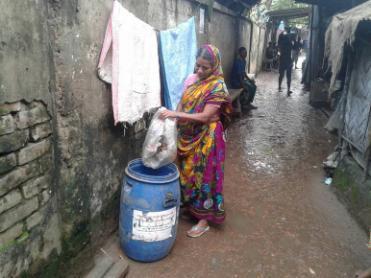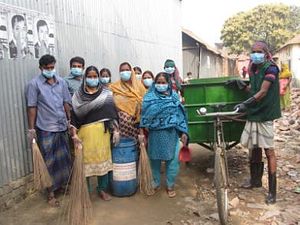“People avoid slums; service providers are reluctant to offer services here as these particular areas of big metropolitan cities are usually dirty, filthy with waste, and stagnant with polluted water,” said Rezia Begum, a dweller of Pukurpar community in Konabari, Gazipur. “We, the slum dwellers and our children, also suffer from various health hazards and waterborne skin diseases.”
Gazipur has an estimated population of 3.5 million living in 329 square kilometers. Currently, Gazipur has weak legislation or no formal garbage management system to deal with the huge amount of rubbish and garbage produced by industries and households. The area lacks a waste disposal site to cope with the 150 tonnes of rubbish produced daily. No garbage management system operates to clear away household or community waste. Failure to regularly clean outside drains results in the overflow of fluid, making pathways slippery and difficult to move on. Disease from contaminated water is common and particularly acute during the rainy season. Common affilications include diarrhea, respiratory infections such as coughs and colds, skin diseases, and infections impacting the kidneys and liver.
“We used to throw garbage here and there, in a nearby puddle. As a result, the whole locality had a stench, and was full of mosquitoes and flies. A neighbor of ours, Kusum Ali — 9 to 10 members of his family were continual diarrhea patients throughout the year,” said Rokeya Begum from Dakshin Tetultola.
To find a solution to this large problem, the Bangladesh Urban Resilience Project (BRUP) is piloting community-based garbage management systems in six targeted communities of Gazipur City Corporation. The project supports Community Development Committees (CDCs) to establish and carry out their particular approach. Below, group of CDC members tell their success stories, share challenges, and offers ways to overcome them.
Rina from Nadir par community was shares her pilot launching experience: “At the very outset, when we first heard that garbage will be collected from home to home, we were surprised. It’s a service for the advanced part of the city, how could we operate this system in a slum area like ours?”
Rina goes on to explain what the Community Based Garbage Management System is and how it operates. A group of people from the same CDC lead the Garbage Management System. CDC members join different training and orientation sessions, and organize meetings and awareness-raising sessions to ensure a positive change within their community.
The CDC members take the lead to mobilize their community, design and facilitate the clean-up process. The community is then sensitized and encouraged to develop action plans to block disease transmission routes and ensure access to healthy and hygienic lifestyles. “Initially, we were worried about the community’s reaction” said Sufia, CDC chairperson of Uttar Tetultola. “In fact, real challenges appeared because we asked them to pay monthly fees for the [garbage] service but they are already habituated to throw garbage anywhere,” she continued.
How did the CDC resolve the issue? “Think about how much money you have to spend if your children suffer from diarrhea. You know, this is the cost of ignorance. We created awareness in this line of logic and changed their behavior,” Sufia said.

An inhabitant of Medical Community putting her household garbage into a drum. Image by Sakib Imtiaz.
Local collection vans and baskets have been provided by BRUP to collect waste and kitchen rubbish. Collectors gather the waste from baskets or drums once a day and dump it at an authorized primary station. The CDC is responsible for the maintenance and security of the van and financial management. The waste is then collected from the primary points and taken to the final disposal point by a large truck. This secondary collection is the responsibility of the city corporation.
The fee for each household is fixed by the CDC and on an average it is 20 taka ($0.25) per month. The accumulated fee is used to pay the collector’s salary. There is one collector at each community. Since the first year of payment is being covered by BRUP, CDCs opened bank accounts and deposited all the collected money for future maintenance and payments. In the first year, BRUP will pay 100 percent of the collector’s. In year two, BRUP will pay 50 percent and in year three, the community will completely manage the cost and BRUP will step back gradually.
This new waste management intervention is experimenting with a range of technologies or processes rather than attempting to find one single solution applicable to all situations. Some communities were facing a temporary dumping place crisis, as their local government imposed an order not to dump wastage at secondary points. “We raised the issue in the WDMC [Ward Disaster Management Committee] meeting and submitted a letter on behalf of the community to seek permission for dumping. Ward councilor gave us permission and now the problem has been solved,” the CDC secretary of Dakshin Tetultola, Rokeya Begum, shared.
Asked whether this community-led approach is working or not, Babli Akter from Nadirpar community says, “Until we had enjoyed the benefits of garbage management, we didn’t realize the importance of it. Now everyone in our community is aware of cleanliness. See, even we are spending money for waste management.”
The project is taking necessary steps to involve the city corporation with this initiative and replicate the system in other wards and communities.
Mamunur Rashid is a development professional working in the urban resilience program with CARE Bangladesh.

































